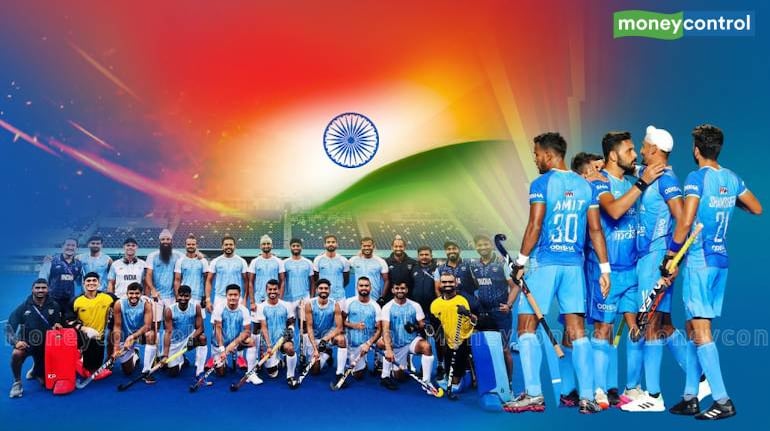



Five years may seem a long time for a world speeding away on its digital wheels, yet the man who captained India to an Olympic hockey bronze at Tokyo - a medal after 41 years - still remembers the semifinal loss to Malaysia at the 2018 Asian Games like it was ‘yesterday’. The very thought of it cuts like a sabre, and revenge may not be the apt word for what he's looking for. Redemption definitely. Manpreet Singh, India’s freeman, the perennial every-zone player on a hockey pitch, defender, midfielder, and the pop-up man in the opposition striking circle, that curved run ending with a spanking shot, still bristles at the thought of Jakarta.
It's 16-1 against Singapore. It’s one of those matches where everything happens and yet doesn’t happen. One-sided games are no big advertisements for the sport; in fact, it yet again showcases the divide, the chasm between the top four and the rest. In the 18 editions of the Asian Games before Hangzhou, India has finished outside the top 4 once, 5th in 2006 Doha; a chapter no one wants to remember for reasons that also spiralled into India not qualifying for the 2008 Beijing Olympics, the only time it hasn’t.
The Indian team is walking past the mixed zone, an area where journalists try and read the mind of a player in minutes. It’s slightly easier as the score-line against Singapore is not something one desires to analyse. But players, tired, sweaty, would prefer the confines of a dressing room, immediately after a match.
Then we play the game.
“Not now,” he says.
“C’mon, two minutes.”
“Ok”, says Manpreet, reeling himself back in towards the barrier.
Sweat is still pouring down his face. It’s humid at Hangzhou. And even in a 16-1 win, players still have to run, probably more, amongst the maze of Singapore defenders. Easy or difficult game, Manpreet is the terrier in the team; shoulders slightly bowed in his 5’ 7” frame, he comes after the ball like a limpet mine. On the ball, give him a line of defenders and he will scythe his way through. If he scores, he will smile at the forwards asking, ‘what was the big deal?’
In times of stress, equalized score-lines, India trailing, he is the pulse of the team. Sub-consciously, in those moments, the team rallies around him. Or, maybe, it’s the elder statesman tag that makes others believe he has the answers. Usually, he does. Moving up, he has the talent to catch a drifting game by the collar and pull it inwards, breaking the stronghold of the opposition. He creates space. Makes the pitch appear bigger with his furrowing runs through the midfield or the flanks.
He doesn’t want to be reminded of India scoring 76 goals in Jakarta (Asian Games 2018 pool stages) and no gold to show for it. At the Asian Games, the bronze is no consolation, not even a silver. Without gold, classify it as abject failure.
In 18 editions, only three gold medals is touching the depths of under-achievement. Who remembers the silver? Manpreet, part of the Incheon 2014 gold medal team understands that emotion and calls it ‘special', an ‘abiding memory’. Of course, the Tokyo bronze would always be tattooed on his and the team’s soul. The Asian Games always has its continental lure and that prize – direct qualification to the Olympic Games.
To fix something, understanding what is wrong is paramount.
“Don’t take these big-scoring games as not important,” says Manpreet. “Goal scoring is vital, the mindset has to be correct and pressure on the ball has to be maximum, irrespective of the team.”
India now play Japan and Pakistan with a third pool game against Bangladesh. They can’t afford to stutter against Japan or Pakistan. In 2018, they beat Japan 8-0, a match so fluent in its efficiency that one wondered anybody could even stand up against India, whether Japan could even recover. Japan went on and won the Asian Games gold while India crashed out in the semifinals against Malaysia, throwing away a lead and then eliminated in the shoot-out.
"These big-scoring games are all about improving connections,” explains Manpreet. “The team has to be mentally strong. It’s about the mind. Let’s not underestimate any team. In the end, it’s about us.”
On the day India beat Uzbekistan 16-0, team coach, the South African Craig Fulton, said: “You have to be in the right state of mind. The team needs to be in the right place. All roads lead to the final.”
Manpreet agrees: “We speak about the last Asian Games to the ones who weren’t there. We share with them what happened and why.”
Failures, at times, are deeply embedded into our psyche. Even when yesterday's victory seems so distant. Sport, largely, is a game of moments, a tiny slip, and a world, painstakingly put together, crumbles.
Harmanpreet Singh, a man so calm save for the hooked-arm raise after scoring a perfect flick, believes: “irrespective of what tournament we played in the last few months, the target is the Asian Games, the main focus is gold.”
Reality checks happen in big games, knock-out matches. It’s your team’s response that decides the colour of the medal. Or if a nightmare of the past can be overturned to become this season’s dream run.
Discover the latest Business News, Sensex, and Nifty updates. Obtain Personal Finance insights, tax queries, and expert opinions on Moneycontrol or download the Moneycontrol App to stay updated!
Find the best of Al News in one place, specially curated for you every weekend.
Stay on top of the latest tech trends and biggest startup news.